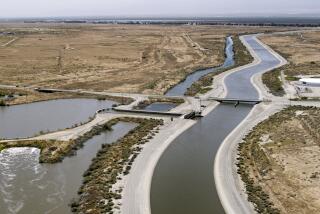Salt shortage: States find it tough with winter storms, icy roads
In the middle of a brutal winter, states throughout the country are grappling with a new crisis, a shortage of rock salt to melt ice on roadways. Here’s a look at what’s being done to combat limited supplies.
What’s the big deal about salt?
Although many Southern California residents are oblivious to winter this year, most of the country is in the grips of another bad storm. When 2 inches of snow is piling on roads every hour, like on Wednesday in the Northeast, highways need help. Rock salt is one way to melt ice on roads because it lowers the freezing point of any water that it comes into contact with. So cities across the nation have been pouring tons of it on roads. It’s a winter road ritual in parts of the county.
Dangerously icy roadways across the eastern half of the U.S. are chewing up rock salt faster than supplies can be replenished. Local and state governments have been forced to initiate salt conservation plans, bring in emergency shipments and try mixing salt with odd substances.
How bad is the salt situation?
Salt producers are stretched to capacity. Some cities, such as Wichita, Kan., are out of salt and are choosing to salt only main roads, using sand for the rest. New York Gov. Andrew Cuomo said salt shortages were complicating highway clearing efforts and ordered 3,500 tons deployed to hard-hit communities.
“I think pretty much every salt mine in the country is out now, or very nearly,” said Harold Mayo, general manager of the Hutchinson Salt Mine in Kansas. “It’s just a very unusual winter as far as demand.”
In Wisconsin, state officials were debating whether it would be better to order additional salt or hire trucking companies to take salt from areas of high supply to places with a low supply.
In Indiana, officials are scheduling extra deliveries, but supply and demand have increased prices, said Nathan Riggs, a spokesman for the Indiana Department of Transportation. A typical winter salt supply usually costs about $33 million. The state had already paid $31 million by mid-January, before the current spate of storms.
“Local agencies are scheduling extra deliveries because they don’t usually have same-size stockpiles, and those deliveries are definitely taking longer to be made,” Riggs said.
Vermont officials have directed salt suppliers to divert shipments to areas with the lowest supplies.
“We definitely have towns that are struggling,” said Wayne Gammell, state maintenance administrator in Vermont. “Because we have enough on hand right now in the state warehouses, we’ve told our suppliers to supply towns to get towns caught up. We’ll take it another week or so.”
Has it ever been this bad?
Michael Sproul, an engineer with Wisconsin’s winter maintenance program, remembers just one such shortage, in the winter of 2007-08. During that season, salt was trucked at a cost of a few million dollars, and thousands of additional tons were purchased – but at three times the typical cost.
Storm after storm this winter has eaten up 60% more salt than the average expended during the last five winters, Sproul said.
Ohio officials, who have already ordered 20% more salt, started seeking bids from suppliers Wednesday to get an additional 210,000 tons. The state is on pace to use more than 1 million tons of salt for the first time in recent memory, said Department of Transportation spokesman Steve Faulkner.
“The frequency and scope of snowstorms this year has been exceptional,” he said.
Are there alternatives to salt?
Many transportation agencies are trying biodegradable products such as beet syrup, potato juice, cheese brine, tomatoes and a corn-based product to improve road salt adhesion and reduce salt use.
The products started appearing in the late 1990s. But their use has been surging amid worries about the both the environmental effects and large amounts of salt contaminating groundwater supplies.
“We can cut your salt usage by a third, saving people some money in the long run,” said Mike Demaray, sales manager for Beet 55, one of the salt-spray mixer options. The sticky substance tints the snow a brownish color, but can be washed off cars and clothes with soap. He said two states had become customers because of the winter’s storms.
Pennsylvania’s Department of Transportation is trying out BEET HEET in Butler County, a product made from processed sugar beet molasses. Indiana, Ohio and Tennessee are using the same or similar products.
“We have seen positive results using the product at temperatures below 15 degrees where salt is not as effective,” department spokeswoman Jamie Legenos said. It’s overall effectiveness and cost is still being studied.
But what about states that aren’t into salt alternatives?
To limit salt use, Wisconsin has tried to spray a chloride solution on the salt as it comes off the truck. The solution is designed to help the salt stick to the road, rather than fly off to the side.
“Dry salt, about 30% will immediately bounce down into the ditches,” said Sproul, the Wisconsin engineer. “Wet, all but 3% will stay on the lane and you’re saving on the application rate.”
Through a growing percentage of salt is being sprayed wet, it’s still only about 50% statewide, he said.
Chloride solutions can be damaging to the environment, corroding steel and pavement. That’s why weird alternatives are growing in popularity.
Is there such a thing as sustainable road clearance?
Possibly in the future.
Xianming Shi, a Montana State University civil engineering professor who researches snow-clearing efforts, said one lingering issue with the bioproducts is that they are made from discards. Beets, for example, are not grown specifically to make the de-icing solution, he said. The potential for a poor quality mix can hinder the benefits.
“We’re getting closer every day toward sustainable winter service, but we still have a long way to go,” he said.
Can anything be done about traffic on the 405?
Probably not with beets.
ALSO:
Livermore National Lab faulted over Lusitania project
Overdosing on heroin: This drug can bring them back
4 arrested on drug charges after death of Philip Seymour Hoffman
More to Read
Start your day right
Sign up for Essential California for news, features and recommendations from the L.A. Times and beyond in your inbox six days a week.
You may occasionally receive promotional content from the Los Angeles Times.







